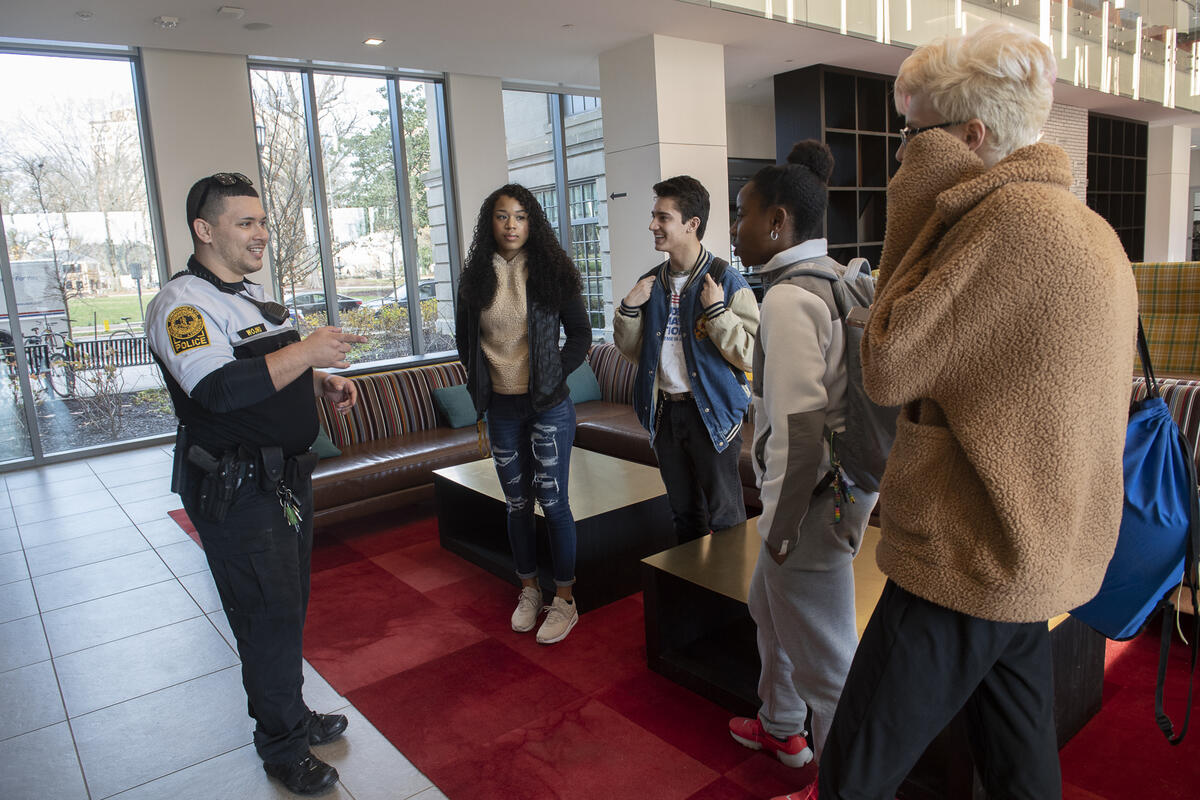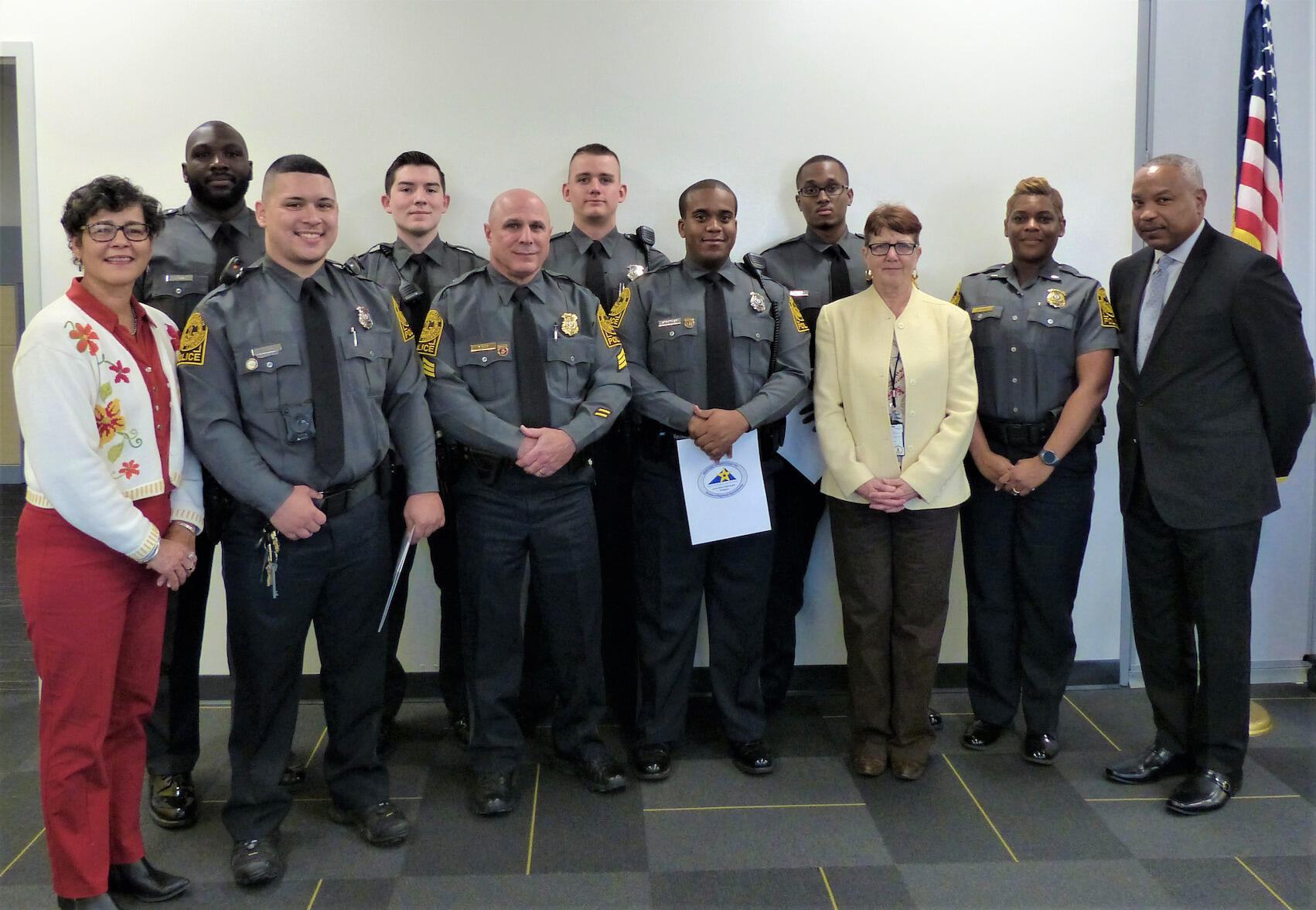
Dec. 12, 2019
‘I wanted to make a difference’: Graduates of VCU Police apprenticeship program are ready to serve
Share this story
In high school, Tony Wojno looked up to his baseball coach as not only a mentor, but as a father figure. His coach also served as a resource officer in Wojno’s school — a law enforcement officer dedicated to K-12 school safety.
It was because of the personal connection and experience with this officer that Wojno decided to pursue a career in policing, he said.
“I wanted to make a difference, like he did for my life.”
Wojno, a 2018 graduate of the VCU Police Academy, was one of six officers to receive a journeyworker’s card this month from the Virginia Department of Labor and Industry after completing the VCU Police Law Enforcement Apprenticeship Program. The journeyworker card — which Wojno earned by completing the apprenticeship program, graduating from the academy and working as a VCUPD officer — serves as a national credential showing recipients have achieved competencies in the occupation and, for VCU’s officers, 2,000 hours of work experience.
VCU Police implemented the Law Enforcement Apprenticeship Program in 2017. The goal was to recruit officer candidates who were passionate about community policing and to retain those focused on the university’s unique safety needs. Wojno and his five fellow officers are the first to complete the LEAP program.
Participants in the VCU program were given modified training prior to the academy, issued apprentice uniforms and given projects — such as checking that AED machines worked in buildings on campus. When they were stationed on the campuses, they served as an extra set of eyes and ears and could report suspicious behavior to police.
Before entering the police academy, Wojno worked on the LEAP staff, which, in his words, gave him a head start on what policing at VCU would be like. The experiences familiarized him with the campuses and the community.
“I think the apprenticeship prepared me more so by humbling me to what the job of being a police officer entails,” Wojno said.

According to the Department of Labor, apprenticeships combine on-the-job training with technical classroom studies. When an apprentice completes all of this training, they earn a journeyworker card.
Patricia Morrison, director of the Division of Registered Apprenticeship in the Department of Labor, said VCU Police is the first law enforcement agency in Virginia to formalize an apprenticeship program through the state. (VCU Facilities Management has an apprenticeship program for trade careers.)
Recruiting new officers has been a challenge for police departments nationally. Interim VCU Police Chief Mike O’Berry said the apprenticeship program was a way to introduce quality candidates to policing in higher education.
“Policing at an urban university has a lot of niche responsibilities and we need to have officers who can be flexible, understanding, patient and willing to address any number of challenges,” O’Berry said. “The apprenticeship helps us retain the best candidates prior to the academy and helps us gauge how their strengths will help make them the best officers for VCU.”
Wojno, a day patrol officer on both campuses, has stepped up his involvement in the department by working to support fellow officers. In October, O’Berry named Wojno the department’s chaplain. He is also a member of the department’s peer support team.
As a newer officer, Wojno is using his experience thus far to promote positive relationships with his colleagues and the students, faculty and staff he’s serving at VCU. Just as in high school, he’s still focused on making a difference for others.
“Policing in the 21st century is definitely community based and I have always tried to do my part in bridging the gap between us and the community,” he said. “It all starts with me and all officers across America should have that mindset in projecting a good image to the people they protect and serve.”
Subscribe to VCU News
Subscribe to VCU News at newsletter.vcu.edu and receive a selection of stories, videos, photos, news clips and event listings in your inbox.










